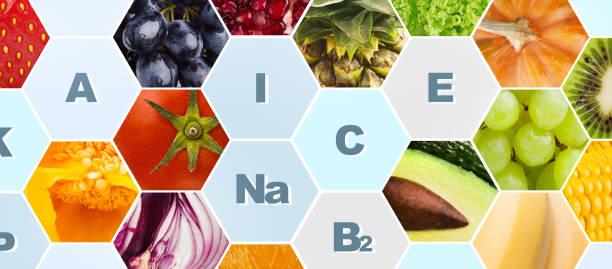
Some links on this site are affiliate links, meaning we may earn a small commission at no extra cost to you. This helps keep Well Is Well running and allows us to share products relevant to this content. Any opinions, reviews, analyses & recommendations are ours alone and have not been reviewed, endorsed, or approved by any of these entities. Thank you for your support.
Vitamin supplements are very popular now as people in the United States look for easy ways to improve their health. However, thinking that just taking a pill will provide all the essential nutrients the human body needs can be misleading. Vitamins and minerals are indeed necessary for many body functions, but it’s vital to understand the source and how the body absorbs and uses them.
Understanding Vitamins and Minerals: The Basics

Vitamins and minerals are organic compounds, including various chemical compounds, and chemical elements, that our bodies need in small quantities and are essential for our overall health. For example, they boost the immune system and support healthy growth.
While vitamins come from plants or animals and minerals come from the earth, we typically get both of them from our food.
The Role of Vitamins in the Body
Vitamins play an important role in maintaining our health. For instance, vitamin D is crucial for bone health, while vitamin K aids in blood clotting. Antioxidants such as vitamins C (ascorbic acid) and E shield our cells from harm caused by free radicals. Additionally, vitamin B plays a vital role in various metabolic functions. Each vitamin’s unique chemical structure and molecular structure, dictates its function within the body’s metabolic processes. Understanding the functions of different vitamins underscores the importance of a balanced diet for overall health.
Essential Minerals for Health
Different minerals, like vitamins, have specific roles in the body. Calcium is crucial for bones, while iron aids in oxygen transport in the blood. These minerals, including new minerals, support various bodily functions and structures, and certain mineral breaks can affect their efficacy. Maintaining electrolyte balance is essential for nerve and muscle function and relies on minerals such as sodium, potassium, and chloride. Dietary supplements can assist individuals who struggle to obtain sufficient minerals from their diet; however, maintaining proper mineral levels entails more than just supplement consumption.
Factors that Influence Nutrient Absorption
Eating a balanced diet full of vitamins and minerals used to be the key to good health. However, just taking in these nutrients does not ensure the body uses them well. Many different factors affect play an important role in affecting the quality and how the body absorbs and uses these nutrients. By understanding these factors, people can improve how they take in nutrients.

Food Nutrient Depletion
It is well known that conventional mass production of food in the US has depleted the soil, and therefore the food, of necessary nutrients. The use of pesticides has also caused health concerns. Furthermore, the import of cheap food from other countries introduces unknown chemicals and questionable manufacturing practices.
Major food manufacturers have altered our food supply under the guise of healthy food. The terms ‘All Natural,’ “Natural Flavors,’ ‘Sugar-Free,’ and ‘Fortified with Vitamins and Minerals’ would appear to be healthy, but I challenge you to google each of the ingredients listed to see what they actually are. Millions of dollars are spent to influence Congress to pass laws that allow for manufacturing practices that allow for such terms but do not necessarily mean what they seem to.
The Impact of Bioavailability on Supplement Efficacy
The concept of bioavailability refers to the amount of nutrients that enter the bloodstream and are usable by the body. Absolute bioavailability, which includes factors like intestinal absorption, is commonly measured for dietary supplements to determine the percentage of nutrient absorption compared to intravenous, or IV, delivery, which is considered 100% bioavailable and reflects how much of the supplement reaches the systemic circulation.
Factors like solubility, molecular size, and interactions with other foods impact bioavailability. Digestive issues or absorption-blocking compounds can significantly reduce nutrient absorption into the bloodstream.

How Digestive Health Affects Nutrient Uptake
The gastrointestinal tract, our “second brain,” is vital for nutrient absorption. A healthy digestive system efficiently breaks down food and aids in nutrient transfer to the blood. Issues like inflammation, parasites and candida can hinder absorption, leading to nutrient deficiencies and health issues. Maintaining gut health through a healthy diet, exercise, and stress management is crucial for optimal well-being.
The Truth About Cheap Supplements – You Get What You Pay For
We get it and it is overwhelming. There are many brands and tempting promises on the shelves.
Choosing cheaper options might look like a good way to save money. However, you should think about the possible downsides. These can include low quality ingredients, fillers, binders and high levels of heavy metals, and have far less effective absorption and possible health risks. Some studies show that a majority of capsules that are swallowed are never fully digested.
Ineffective supplement formulas can result from various factors like poor storage, manufacturing, or chemical breakdown over time, leading to inadequate nutrient levels and hidden deficiencies.
High-quality nutritional supplements use pure, carefully tested ingredients to ensure potency and purity. Choose supplements based on ingredient quality, brand reputation, and absorption for optimal health benefits.
Enhancing the Effectiveness of Vitamins and Minerals
Our bodies absorb nutrients best when they work together. By connecting different supplements and changing our lifestyles, we can create the perfect conditions to use those nutrients for better health benefits. Making simple changes to your daily habits and supplement routine can help your body absorb nutrients more effectively and really improve results.
The Role of Co-factors and Co-enzymes
The process of nutrient absorption involves key players like co-factors and co-enzymes which are often overlooked molecules that support chemical reactions in the body.
Co-factors, such as magnesium and zinc, assist enzymes in functioning effectively. Co-enzymes, primarily derived from B vitamins, aid in transporting molecules within cells to facilitate vital chemical processes.
Optimal Timing and Combining Nutrients for Better Absorption
Timing is also important to determine how to feed your body nutrients. When you ingest specific supplements as well as how you mix some nutrients can affect how well your body uses them. For example:
-
Fat-soluble vitamins (A, D, E, K): They get absorbed best with meals that have healthy fats (think coconut oil or avodacos).
-
Iron: You absorb more if you take it with foods that are high in vitamin C.
-
Calcium and magnesium: It’s better to take them apart because they compete for absorption.
Always talk to your doctor or a registered dietitian for advice that’s right for you. Adjusting your routine to fit your needs and meal times can really help your body process nutrients better. There are specific lab tests that can be done that provide a much broader picture of your health than the commonly abbreviated lab panels.
How do age and gender influence the recommended daily intake of vitamins?
Age and gender influence the recommended daily intake of vitamins due to variations in metabolic rates, hormonal levels, and nutritional needs. For instance, pregnant women may require higher doses of certain vitamins like folic acid, while older adults may need more Vitamin D for bone health.
Debunking Common Myths About Supplements

The world of nutrients is full of conflicting information. This can cause confusion and even harmful habits. Many people think that “more is always better.” Others are unsure about natural versus synthetic sources. It’s really important to know what is true and what is not.
More is Not Always Better: The Risks of Over-Supplementation
If some is good, more is better, right? Not necessarily! Vitamins and minerals are essential for health, but the body only requires them in small amounts. Excessive intake does not equate to better health and can lead to health issues.
Overconsumption of certain vitamins, including folic acid, can disrupt natural processes, causing toxicity. For instance, studies have shown that too much vitamin A, especially from supplements, can harm bone health and pose risks during pregnancy. It is possible to get lab tests done without a doctor referral if you are interested in knowing where you stand. It is advised to speak with a professional about dosages of vitamins and minerals.
Adhere to recommended dosages and a best practice is to consult with a nutritionist before trying new supplements. Nutrition Response Testing (NRT) and Qi-5 providers can also provide testing to determine what substances your body needs and use high quality supplements to balance your body. They can guide you on safe intake levels tailored to your needs, reducing the risk of overconsumption and promoting optimal health.

Natural vs. Synthetic: What You Need to Know
The discussion about natural and synthetic vitamins can be confusing. Understanding the differences is important for making good choices.
Synthetic vitamins are made in labs to match the chemical structure of vitamins found in nature. They usually work the same as natural vitamins.
Still, things like co-factors and how well the body recognizes and uses these nutrients can affect how well they are absorbed. In the end, getting vitamins and minerals from a healthy, balanced diet is the best way. Quality supplements can help when needed but it is advised that they should not be the primary source for nutrition.
The Science of Bioavailability
Bioavailability is how much of a nutrient our body can absorb and use. This important idea affects how well vitamins and minerals work, no matter where they come from.
Understanding bioavailability helps us choose and use supplements wisely for the best health results.
Key Vitamins, Minerals and Other Substances for Optimal Health
The other factor to consider is the source of the substance you are eating or the supplement you are taking. In addition to the depletion of nutrients from our soil, some farming practices allow for chemicals to be used in food manufacturing introducing harmful substances from the very food you are eating to keep you healthy! Source your food from reputable places and always look at the ingredients and fine print. You have to be your own health advocate and make sure you educate yourself on what you are putting into your body.
When taking supplements, it is possible to find products that include a bio-enhancer but not all of them do. The more important point here is to make sure you are shopping for quality and not letting low prices drive your decisions.
Vitamins
It isn’t simply enough to eat a carrot and get the full benefit of the vitamin A. The full benefit comes from mixing the carrot with a healthy dietary fat to help the body absorb as much of the nutrient as possible. The chart below includes the most common vitamins the body needs.
|
Vitamin |
Enhancers for Bioavailability |
Food Sources |
Function in the BodyVitamin A (Retinol, Beta-Carotene) |
|
Vitamin A (Retinol, Beta-Carotene) |
Dietary fat, Zinc, Vitamin E |
Liver, egg yolks, dairy, carrots, sweet potatoes, leafy greens |
Vision, immune function, skin health |
|
Vitamin D |
Dietary fat, Magnesium, Vitamin K2 |
Sunlight, fatty fish (salmon, mackerel), egg yolks, fortified dairy |
Bone health, immune function, calcium regulation |
|
Vitamin E |
Dietary fat, Vitamin C, Selenium |
Nuts (almonds, hazelnuts), seeds (sunflower), avocado, spinach |
Antioxidant, skin health, cell protection |
|
Vitamin K (K1, K2) |
Dietary fat, Vitamin D, Magnesium |
Leafy greens (kale, spinach), fermented foods (natto, sauerkraut), egg yolks |
Blood clotting, bone health |
|
Vitamin C |
Bioflavonoids, Water |
Citrus fruits, bell peppers, strawberries, kiwi, tomatoes |
Antioxidant, immune support, collagen production |
|
Vitamin B1 (Thiamine) |
Magnesium, Sulfur |
Whole grains, pork, legumes, nuts |
Energy metabolism, nerve function |
|
Vitamin B2 (Riboflavin) |
Magnesium, Zinc, Iron |
Dairy, eggs, mushrooms, leafy greens |
Energy production, skin and eye health |
|
Vitamin B3 (Niacin) |
Tryptophan, B6, Magnesium |
Meat, fish, whole grains, peanuts |
Energy metabolism, DNA repair, cholesterol regulation |
|
Vitamin B5 (Pantothenic Acid) |
Cysteine, Vitamin C |
Eggs, avocado, mushrooms, whole grains |
Hormone and neurotransmitter production |
|
Vitamin B6 (Pyridoxine) |
Magnesium, Zinc |
Poultry, bananas, potatoes, chickpeas |
Amino acid metabolism, neurotransmitter function |
|
Vitamin B7 (Biotin) |
Magnesium, Sulfur |
Eggs, nuts, seeds, sweet potatoes |
Metabolism of fats and carbohydrates, hair and nail health |
|
Vitamin B9 (Folate) |
Vitamin B12, Vitamin C |
Leafy greens, beans, citrus fruits, liver |
DNA synthesis, red blood cell production |
|
Vitamin B12 (Cobalamin) |
Intrinsic Factor, Calcium, Folate |
Meat, fish, dairy, eggs, fortified cereals |
Nerve function, red blood cell formation |
Minerals
Minerals also serve important functions in the body. Read below to see a breakdown:
|
Mineral |
Enhancers for Bioavailability |
Food Sources |
Function in the Body |
|
Calcium |
Vitamin D, Vitamin K2, Magnesium, Boron |
Dairy, leafy greens, sardines, almonds |
Bone health, muscle function, nerve signaling |
|
Magnesium |
Vitamin D, Vitamin B6 |
Nuts, seeds, leafy greens, dark chocolate |
Muscle and nerve function, enzyme reactions |
|
Potassium |
Magnesium, Sodium |
Bananas, potatoes, beans, yogurt |
Fluid balance, nerve function, muscle contractions |
|
Sodium |
Potassium, Chloride |
Salt, seaweed, celery |
Fluid balance, nerve signaling, muscle function |
|
Chloride |
Sodium |
Salt, seaweed, tomatoes |
Acid-base balance, digestion |
|
Zinc |
Vitamin A, Copper, Protein |
Meat, shellfish, pumpkin seeds, lentils |
Immune function, wound healing, DNA synthesis |
|
Iron |
Vitamin C, Copper |
Red meat, spinach, lentils, quinoa |
Oxygen transport, energy production |
|
Copper |
Zinc, Vitamin C |
Shellfish, nuts, seeds, whole grains |
Red blood cell formation, iron metabolism |
|
Manganese |
Magnesium, Zinc, B Vitamins |
Whole grains, nuts, tea, leafy greens |
Bone formation, metabolism, antioxidant function |
|
Selenium |
Vitamin E, Protein |
Brazil nuts, seafood, eggs, mushrooms |
Thyroid function, antioxidant support |
|
Iodine |
Selenium, Tyrosine |
Seaweed, dairy, eggs, iodized salt |
Thyroid hormone production, metabolism regulation |
|
Boron |
Magnesium, Calcium, Vitamin D |
Avocados, nuts, dried fruit, leafy greens |
Bone health, hormone regulation |
|
Chromium |
Vitamin C, Amino acids |
Broccoli, whole grains, meats, nuts |
Glucose metabolism, insulin sensitivity |
|
Molybdenum |
Sulfur-containing foods |
Legumes, whole grains, nuts |
Enzyme function, metabolism of amino acids and drugs |
Other Essential Substances
It doens’t stop with vitamins and minerals. There are additional substances that the brain uses to function at its best. Read about them below.
|
Substance |
Role in the Body |
Enhancers for Bioavailability |
Food Sources |
Function in the Body |
|
Omega-3 Fatty Acids (EPA/DHA) |
Brain health, anti-inflammatory |
Vitamin E, Vitamin D |
Fatty fish (salmon, sardines), flaxseeds, walnuts |
Brain health, anti-inflammatory |
|
Choline |
Brain function, liver detox |
Folate, Vitamin B12 |
Eggs, liver, fish, nuts |
Brain function, liver detox |
|
Coenzyme Q10 (CoQ10) |
Energy production, heart health |
Dietary fat, Vitamin E |
Organ meats, fatty fish, nuts |
Energy production, heart health |
|
Creatine |
Muscle energy, strength |
Carbohydrates, Sodium |
Red meat, fish |
Muscle energy, strength |
|
L-Carnitine |
Fat metabolism, energy |
Vitamin C |
Red meat, dairy, fish |
Fat metabolism, energy |
|
Glutathione |
Antioxidant, detoxification |
Vitamin C, Selenium, Sulfur |
Garlic, onions, cruciferous vegetables, avocado |
Antioxidant, detoxification |
|
Collagen |
Skin, joints, gut health |
Vitamin C, Copper |
Bone broth, collagen supplements, chicken skin |
Skin, joints, gut health |
|
Probiotics |
Gut health, digestion |
Prebiotics, Fiber |
Yogurt, kimchi, sauerkraut, kefir |
Gut health, digestion |
|
Prebiotics |
Feed beneficial gut bacteria |
Fiber, Polyphenols |
Garlic, onions, bananas, leeks |
Feed beneficial gut bacteria |
|
Fiber |
Digestion, blood sugar balance |
Water |
Whole grains, beans, vegetables |
Digestion, blood sugar balance |
Additional Reading
Prenatal vitamins: Why they matter, how to choose – Mayo Clinic
Vitamins and Minerals (for Teens) | Nemours KidsHealth
Biochemistry, Fat Soluble Vitamins – StatPearls – NCBI Bookshelf